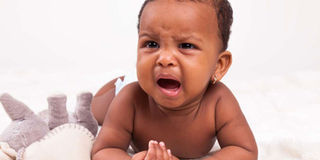Myths fuel barbaric removal of 'milk' teeth

The removal of baby teeth is practised in some communities where herbalists and traditional healers use hot nails, sharpened bicycle spokes, hooked iron bar, razor blades or penknives to pull out the primary canines of a child. PHOTO | FOTOSEARCH
In June, Kenya and other East African countries signed a declaration to end infant oral mutilation, the removal of children’s healthy primary teeth.
In a document posted online in the journal Nature, Dr Miriam Muriithi, the ministry’s chief dental officer, signed a statement of commitment along with colleagues from Rwanda, Ethiopia, Congo, Somalia, Uganda and Tanzania for the next 10 years.
However, the lecturer driving the cause has said the Health ministry has not moved an inch to end the barbaric act.
Prof Arthur Kemoli, from the University of Nairobi's department of paediatric dentistry and orthodontics, said children in Kenya are still dying due to infant oral mutilation.
Prof Kemoli, who is also the chairman of the Paediatric Dentistry Association of East Africa, told HealthyNation there was no policy or guideline from the ministry to end the act that he termed akin to female circumcision.
The removal of baby teeth is practised in some communities where herbalists and traditional healers use hot nails, sharpened bicycle spokes, hooked iron bar, razor blades or penknives to pull out the primary canines of a child.
The buds of the teeth are considered to be "worms" that cause diseases in children aged between four months and one and a half years. The traditional healers also use fingernails, rusty wires, knitting needles, scissors and broken glasses. There have been reported deaths resulting from blood loss, and shock as a result of the rudimentary surgery.
BLOOD LOSS
Prof Kemoli said the children were exposed to infections such as septicaemia, an overload of bacteria in the blood, tetanus and blood-borne diseases such as hepatitis B and HIV/Aids. "They remove the teeth without any anaesthesia,” he said, “Then, to prevent blood loss, they smear other things such as charcoal powder, cow dung, faecal matter and other unhygienic substances that expose the child further to infections."
It is not known where the communities learnt this practice from. However, literature points to a European surgeon, Joseph Hurlock, who championed cutting the soft part of the gum to hasten the growth of teeth in children in the precolonial era.
The practice has since lost its popularity, but some communities in East Africa held on to it. In Kenya, the Luo community refer to the teeth as it lak marach (bad teeth), ebinyo in Uganda among the Iteso and Japadhola, and Tanzanians meno ya nailoni (nylon teeth).
Prof Kemoli said teeth were often removed when children began to move about and crawl. "This is the time the child puts many things in their mouths using the same hands with which they crawl and are prone to infections, and so when the child has developed fever and diarrhoea, the teeth are blamed for them."
DISOWN CHILD
In some communities in Uganda, the prevalence of this practice is as high as 16 per cent.
Another study found that more than 70 per cent of infants who were hospitalised with diarrhoea had canines extracted to cure their disease.
Similar cases have also been reported among the Maasai, the Kamba and the Maragoli in Kenya.
Some working mothers in Nairobi told HealthyNation they had removed their children's teeth in the same way. The women cited influence from their mothers in law as well as keeping up with traditions for taking their children to traditional healers to remove the teeth.
Dr Vitalis Ogola, a Kisumu dentist, said he had dealt with a child who suffered the negative consequences of the removal of teeth in his clinic. Dr Ogola termed the act violent removal milk teeth.
"They are teeth that grow earlier than the anticipated six months, and for this reason, many communities liken the teeth to a bad omen or blame them when a child has a fever. I know some communities like the Maragoli where a woman can even be disowned for having a child with these teeth," he told HealthyNation.
Dr Ogola said sometimes the milk teeth interfere with suckling, causing discomfort to the mother's nipples. If that is the case, dentists can smooth the teeth, rather than remove them.
Part of the reason the government has not acted on the barbaric practice is due to lack of data, research shows.



